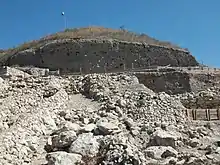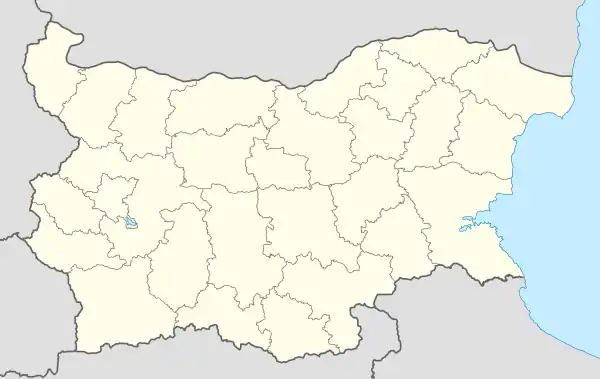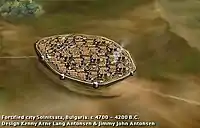Солницата | |
 | |
 Shown within Bulgaria | |
| Location | Bulgaria |
|---|---|
| Region | Varna |
| Coordinates | 43°07′42″N 27°28′21″E / 43.1284°N 27.4725°E |
| Type | Prehistoric settlement (city) |
| Length | 110 m |
| Width | 110 m |
| History | |
| Periods | Neolithic, Chalcolithic |
| Cultures | Karanovo culture, Hamangia culture, Varna culture, Gumelnița–Karanovo culture |
| Site notes | |
| Condition | ruins |
| Website | https://provadia-solnitsata.com/en |
Solnitsata (Bulgarian: Солницата, "The Saltworks") was a prehistoric town located in present-day Bulgaria, near the modern city of Provadia. Believed by archaeologists to be the oldest town in Europe, Solnitsata was a fortified stone settlement - citadelle, inner and outer city with pottery production site and the site of a salt production facility approximately six millennia ago;[1] it flourished ca 4700–4200 BC.[2] The settlement was walled to protect the salt, a crucial commodity in antiquity.[3] Although its population has been estimated at only 350,[3] archaeologist Vassil Nikolov argues that it meets established criteria as a prehistoric city.[4]
Salt production drove Solnitsata's economy, and the town is believed to have supplied salt throughout the Balkans. A large collection of gold objects nearby has led archaeologists to consider that this trade resulted in great wealth for the town's residents — Varna Necropolis.[1] Nearby is the ancient Anhialos, whose livelihood was the extraction of sea salt. The extraction technology can be seen in the Salt Museum, Pomorie.
The town is believed to have been destroyed by an earthquake.[5]
 Artist's reconstruction
Artist's reconstruction
See also
References
- 1 2 Maugh II, Thomas H. (1 November 2012). "Bulgarians find oldest European town, a salt production center". The Los Angeles Times. Retrieved 1 November 2012.
- ↑ Survival of Information: the earliest prehistoric town in Europe
- 1 2 Squires, Nick (31 October 2012). "Archaeologists find Europe's most prehistoric town". The Daily Telegraph. Retrieved 1 November 2012.
- ↑ Nikolov, Vassil. "Salt, early complex society, urbanization: Provadia-Solnitsata (5500-4200 BC) (Abstract)" (PDF). Bulgarian Academy of Sciences. Retrieved 1 November 2012.
- ↑ Ranguelov, Boyko; Nikolov, Vassil (2010). Ancient earthquake data extraction by archeological findings. EGU General Assembly 2010. 2–7 May 2010. Vienna, Austria. Bibcode:2010EGUGA..12.6393R.